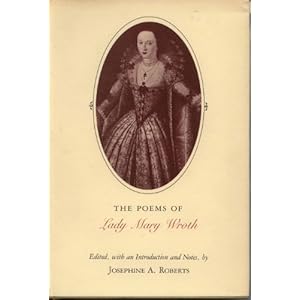 In earlier centuries it was not so easy to pusue a career in writing if you were a woman. In the 17th century there were a few notable women that made a name for themselves through their writing, Aphra Behn was probably the most famous, but Mary Wroth was another whose life and works are often overlooked today. I think her life is fascinating and she is on my shortlist of 'what to write about next.'
In earlier centuries it was not so easy to pusue a career in writing if you were a woman. In the 17th century there were a few notable women that made a name for themselves through their writing, Aphra Behn was probably the most famous, but Mary Wroth was another whose life and works are often overlooked today. I think her life is fascinating and she is on my shortlist of 'what to write about next.'Lady Mary Wroth was the daughter of Sir Robert Sidney, later Earl of Leicester, and Lady Barbara Gamage. She is best known as the first English woman to write a sonnet sequence and her work helped to open up the English literary world to women. She was one of the first women writers to move beyond solely religious or pious subject matter, by writing secular love poetry and romances.
She was born Mary Sidney, on October 18, 1587 and like other wealthy girls of her day, Wroth was taught at home by private tutors. Her mother was known as a patron of the arts, and in 1973 a previously unknown manuscript containing 66 poems written by her father was discovered. A love of poetry seemed to run in the family. Mary Wroth was heavily influenced by her father's literary brother and sister - her uncle, Sir Philip Sidney, was famous as a poet, and her aunt, Mary Sidney, Countess of Pembroke, both composed her own and edited her brother's works.
In contrast to Mary Wroth's literary family, her husband, Sir Robert Wroth, whom she married in 1604, had little interest in the arts. He was a wealthy landowner and preferred hunting and outdoor pusuits.Sir Robert Wroth had a reputation as a wastrel, a spendthrift, a drunkard, and a womanizer. Mary must have been relieved at his death, though not when she discovered he had left her in debt.
In contrast to Mary Wroth's literary family, her husband, Sir Robert Wroth, whom she married in 1604, had little interest in the arts. He was a wealthy landowner and preferred hunting and outdoor pusuits.Sir Robert Wroth had a reputation as a wastrel, a spendthrift, a drunkard, and a womanizer. Mary must have been relieved at his death, though not when she discovered he had left her in debt.
However, her husband's friendship with King James I did at least bring her to court. She even got a role in a masque - Ben Johnson's Masque of Blackness, as the Ethiopian nymph Baryte. Lady Mary became a personal friend of Ben Jonson who dedicated The Alchemist to her, and there has been speculation that she might have been his lover, though there is little evidence to support it.

After her husband's death she could no longer afford the expense that attendance at court demanded, and she was plagued by vicious rumours, which led eventually to her fall from favour with Queen Anne. This led to her concentrating more on her work, and in doing so she produced Urania, a pastoral romance containing thinly veiled references to characters at court. Sir Edward Denny, obviously suffering from a guilty conscience, took the work to refer to him, and an account of his own infidelities, and he complained to the King.
Denny succeeded in having Wroth's book removed from circulation, and her work fell out of favour. Love's Victory, a tragi-comedy was written in the mid 1620's despite her lack of popularity. Mary Wroth died almost a recluse in 1653, at the age of 66.
From her long poem: Pamphilea to Amphilanthus
And all minds draw his wonders to admire,
To see how cuningly hee, wanting eyes,
Can yett deseave the best sight of desire:
The wanton child, how hee can faine his fire
So pretely, as none sees his disguise!
How finely doe his tricks, while wee fooles hire
The badge, and office of his tirannies,
For in the end, such jugling hee doth make
As hee our harts, in stead of eyes doth take
For men can only by theyr slieghts abuse
The sight with nimble, and delightful skill;
Butt if hee play, his gaine is our lost will:
Yett childlike, wee can nott his sports refuse.
